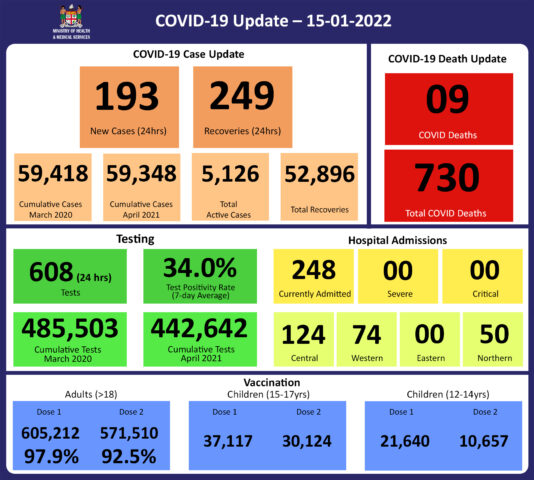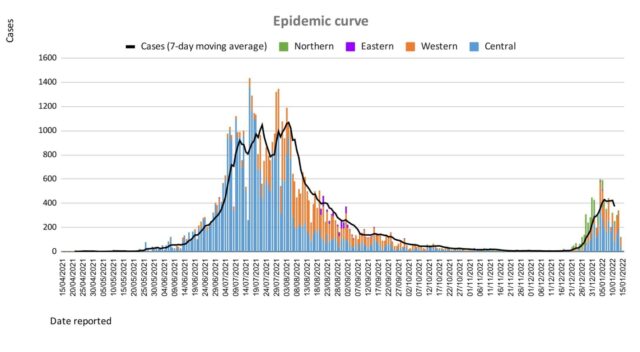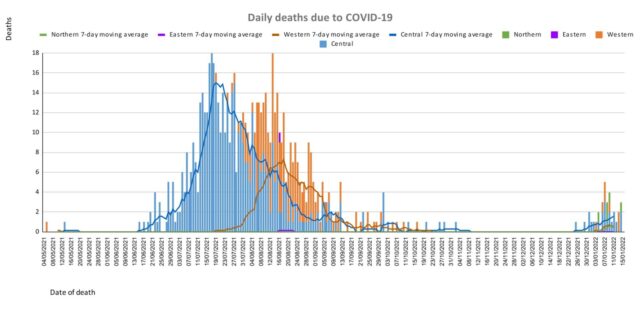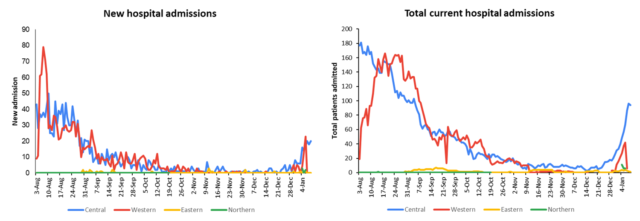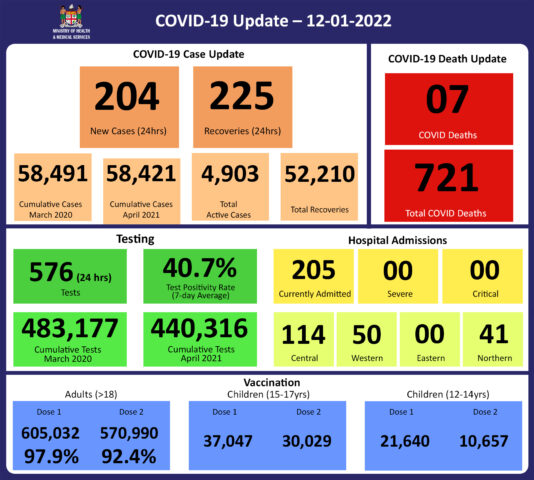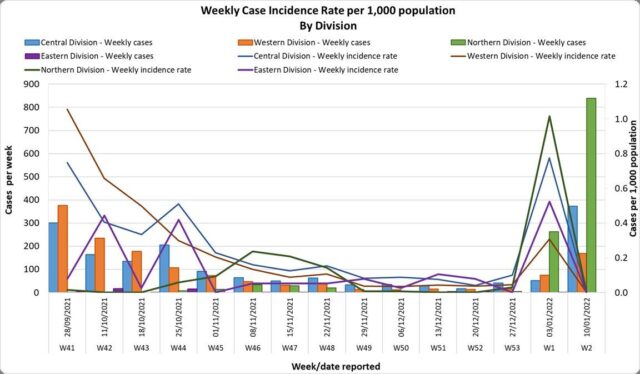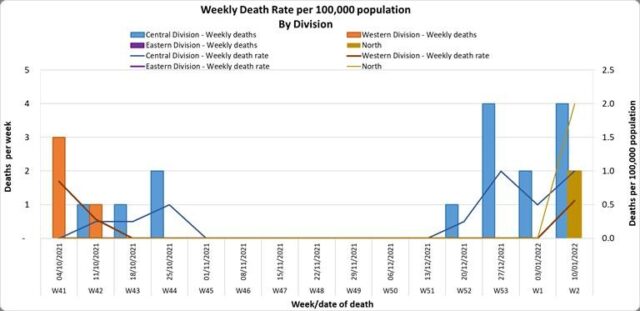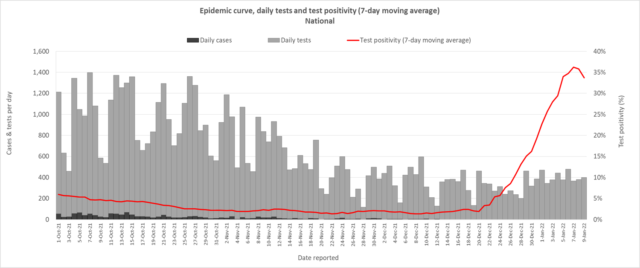COVID-19 Situation Update
Monday 17th January 2022
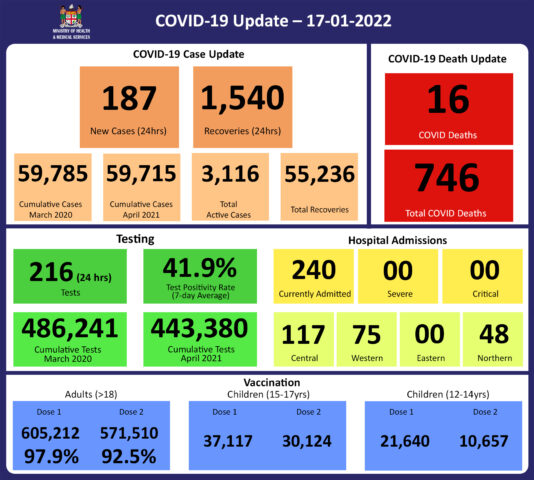
| Transmission Update:
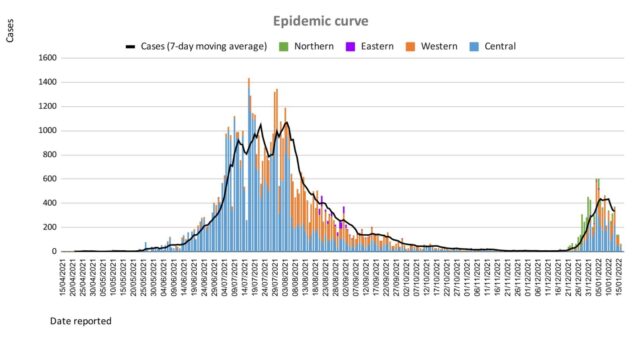
Since the last update on 15/01/2022, we have recorded a total of 329 new cases; of which 142 new cases were recorded on 16/01/2022 and 187 new cases in the last 24 hours ending at 8 am this morning.
Of the 329 cases recorded since the last update, 213 cases were recorded in the Central Division; 105 cases were recorded in the Western Division, 11 cases were recorded in the Northern Division, and nil cases in the Eastern Division.
Overall, there have been 59,715 cases recorded, with 68% of the cases from the Central Division, 28% of the cases from the Western Division, 1% of the cases from the Eastern Division, and 3% from the Northern Division.
Our national 7- day rolling average is 334 daily cases calculated for 13th January 2022. |
| Deaths:
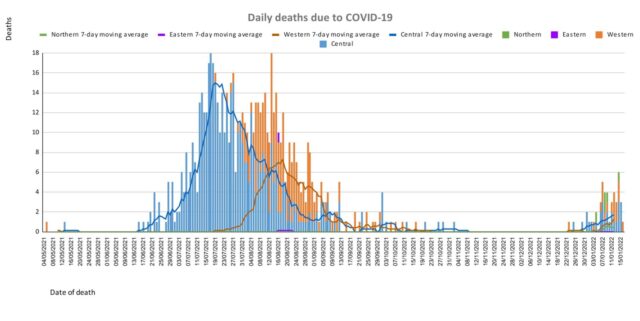
This curve depicts the daily death count by division since the 2nd wave of this outbreak that began in April 2021. Overall, the death rates for the Central, Western, and Northern Divisions indicate an upward trend.
There are 16 new COVID-19 deaths to report from January 8th to January 16th:
The first COVID-19 death to report is of a 53-year old male from the Western Division who died at home on 23/12/2021. He was not vaccinated.
The second COVID-19 death to report is of a 92-year-old male from the Western Division who died at home on 08/01/2022. He was not vaccinated.
The third COVID-19 death to report is of a 38-year old female from the Western Division who presented to the Lautoka Hospital on 08/01/2022. She was admitted but later died on 12/01/2022. She had pre-existing medical conditions that were assessed to have contributed to her death. She was fully vaccinated.
The fourth COVID-19 death to report is of a 54-year old female from the Western Division who presented to the Lautoka Hospital on 11/01/2022. She was admitted and later died on 12/01/2022. She had pre-existing medical conditions and was fully vaccinated.
The fifth COVID-19 death to report is of a 68-year old male from the Western Division who died at home on 16/01/2022. He had pre-existing medical conditions and was not vaccinated.
The sixth COVID-19 death to report is of a 65-year old male from the Western division who died at home on 12/01/2022. He had pre-existing medical conditions and was fully vaccinated.
The seventh COVID-19 death to report is of a 69-year old female from the Western Division who died at home on 14/01/2022. She was not vaccinated.
The eighth COVID-19 death to report is of a 66-year old male from the Western division who died at home on 14/01/2022. He had a significant pre-existing medical condition which was assessed to have contributed to his death. He was fully vaccinated.
The ninth COVID-19 death to report is of an 81-year old male from the Western Division who died on 11/01/2022. He was not vaccinated.
The tenth COVID-19 death to report is of a 71-year old female from the Central Division who died on 14/01/2022. She had pre-existing medical conditions and was not vaccinated.
The eleventh COVID-19 death to report is of a 47-year old female from the Central Division who died at home on 15/01/2022. She had multiple pre-existing medical conditions and was not vaccinated.
The twelfth COVID-19 death to report is of a 21-year old male from the Central Division who died at home on 16/01/2022. He had no known pre-existing medical conditions and he was fully vaccinated. In accordance with the protocol for all deaths outside the hospital or on arrival, a sample was collected after death and tested for COVID-19, with a positive result. After an investigation, it has been determined that, in the absence of evidence of other illnesses, COVID-19 was the cause of death.
The thirteenth covid-19 death to report is of a 55-year old female from the Central Division who died at home on 13/01/2022. She had a pre-existing medical condition and was fully vaccinated.
The fourteenth COVID-19 death to report is of a 97-year-old female from the Central Division who died at home on 15/01/2022. She was fully vaccinated.
The fifteenth COVID-19 death to report is of a 60-year old female from the Central Division who died at home on 12/01/2022. She had pre-existing medical conditions and was not vaccinated.
The sixteenth COVID-19 death to report is of a 74-year old male from the Central Division who presented to the CWMH Emergency Department on 15/01/2022. He was admitted and later died on 16/01/2022. He was fully vaccinated.
There has been a total of 746 deaths due to COVID-19 in Fiji. Please note that due to the time required by clinical teams to investigate, classify and report deaths, a 4-day interval is given to calculate the 7 days rolling average of deaths, based on the date of death, to help ensure the data collected is complete before the average is reported. Therefore, as of January 111th, 2022, the national 7 days rolling average for COVID-19 deaths per day is 2.4, with a case fatality rate of 1.32%.
We have recorded 685 COVID-19 positive patients who died from other serious medical conditions unrelated to COVID-19; their doctors determined that COVID-19 did not contribute to their deaths, therefore these are not classified as COVID-19 deaths. |
Hospitalization:
There is an upward trend in hospitalizations in the Western, Central, and Northern Divisions. Using the WHO clinical severity classification, 53% (n=125) of the admissions of COVID-19 positive patients are categorized as asymptomatic and mild, 35% (n=85) are categorized as moderate and 10% (n=25) as severe with 5 cases in the critical category. Anyone admitted to the hospital is tested before admission, therefore, a significant number of people are admitted to the hospital for non-covid health conditions, but incidentally test positive due to the high transmission in the community. These patients are admitted with COVID-19 rather than for COVID-19. The number of people being admitted for COVID-19 remains low compared to the previous wave.
Testing:
216 tests have been reported for January 16th, 2022. . The 7-day daily test average is 577 tests per day or 0.7 tests per 1,000 population.
The national 7-day average daily test positivity is 41.8%. The high positivity rate is an indication of widespread community transmission.
Public Advisory:
The increasing deaths, including the death of a 21-year-old person announced in today’s update, is a sad reminder of the ongoing toll this virus has taken on individuals and our community. We know that Omicron is less likely to cause severe disease than other variants, meaning that most people who get infected will recover well at home without the need for medical intervention. And our high vaccination rates will also continue to provide protection against severe disease. However, people who are over the age of 50 or have significant chronic illnesses, still have a higher risk of severe disease. And sadly, when cases in the community are very high, rare events also occur, such as severe illness and deaths in the young without significant chronic illness. We saw this during the second wave and we are now beginning to see this in the third wave. We urge everyone to take heed of the advice on how to prevent yourself and others from getting infected and developing severe disease. And we ask everyone to be aware of the symptoms of severe COVID-19 disease, and to immediately seek medical care if present:
Having trouble breathing (shortness of breath or difficulty breathing), ongoing chest pain, severe headache, confusion, inability to stay awake or wake up, pale, grey or blue-colored skin, lips or fingernails, worsening weakness, coughing blood.
COVID safe measures
The public is advised that strict adherence to personal COVID safe measures is very important in this 3rd wave. Wear a well-fitted mask that covers your mouth and nose when you are in public places and when attending gatherings. Avoid crowds and poorly ventilated spaces. Maintain at least 2 metres of physical distancing from others when outside your home. Wash your hands frequently with soap and water or use an alcohol-based hand sanitiser. Stay home and do not attend any gatherings if you have any symptoms of COVID-19. Get vaccinated if you are eligible and have not yet been vaccinated. And get a booster dose if you are over the age of 18 and it has been at least 5 months since your second dose, especially if you are at higher risk of severe disease.
Healthcare workers and community-wide response
With the pandemic into its second year, the Ministry of Health and Medical Services has had to maintain emergency mode operations for much of this time. At the present time, our staff are attending to the COVID-19 response operations, facilitating the health response to the current adverse weather conditions, helping with the NDMO response that will also deploy to the volcano eruptions affected islands of the Lau group, and at the same time maintain as far as possible our normal non-COVID functions.
As highlighted by WHO, there is data to show that more than 1 in 4 health workers globally has experienced mental health issues during the pandemic and several countries have reported that many health workers have considered leaving or have left their jobs because of difficult working conditions, staffing constraints, and the distress of making life and death decisions every day under intense pressure. There is an urgent need to safeguard the welfare of our medical staff by ensuring that they get some rest and attend to family needs. As such we will be embarking on initiatives to ensure that our staff moves back to working normal working hours and to take official leave entitlements accrued over the past year.
Health workers and frontliners have done their best for two years to protect as many of us as possible; we must now do our part to protect them, by getting vaccinated, and by taking precautions to prevent becoming infected, or infecting someone else. As we have seen all over the world, even if Omicron is less likely to cause severe disease or deaths compared to previous variants, higher levels of transmission mean more people getting infected in a shorter time period, which may still lead to a high number of hospitalizations and deaths. And even if people are admitted with COVID, rather than for COVID, it is still required that hospitals and staff are organized to separate and care for COVID and non-COVID patients. It also means more people off work, including health workers. Together this puts further strain on an already stressed health system. We must remember that COVID-19 is only one challenge that health workers face every day. Taking the pressure off health systems will enable them to deal with the many other health challenges that our people face. The COVID 19 response should now be a community-wide, whole-of-society program, where everyone plays their role.
As such while vaccination deployment will continue, our current efforts will be to support other Ministries and business entities to develop COVID safe protocols and to provide the appropriate oversight processes that ensure we all function in a COVID safe manner.
Together with the Ministry of Commerce, Trade, Tourism, and Transport we have put together a number COVID-Safe Protocols as approved by the respective Permanent Secretaries, and these are published online at https://www.mcttt.gov.fj/covid-19-business-protocols/, with effect from 17 January 2022— Protocol for COVID-Safe:
- Business Operations;
- Retail Operations;
- Operations for Houses of Worship;
- Protocol for Enhanced Ventilation;
- Operations for Hairdressers and Salon Services;
- Operations for Tattoo Parlours;
- Gym Operations;
- Cinema/Movie Theatre Operations;
- Operations of Bars and Taverns;
- Gaming Venue Operations;
- Tourism Accommodation Operations;
- Protocol for Land Transport Services;
- Operations for Outdoor Events;
- Operations for Independent Event Halls and Hire Venues.
The COVID-19 Incident Management Unit had been rolling out community engagement training with community health workers, turaga-ni-koro, mata-ni-tikina, church leaders, school managers, headteachers, and principals in rural areas throughout Fiji. The outcome of this training is COVID-19 preparedness equipping local communities with the knowledge to carry out community-based surveillance, care pathways for COVID-19 cases, and COVID-19 safe measures.
The impact of our vaccination coverage has been truly encouraging. We have achieved high vaccination in those most likely to be infected and we have fully vaccinated more than 90% of people over the age of 15. The immunity that has been built through vaccination, together with the numbers of people who have gained immunity due to prior infection, means that the vast majority of people infected by Omicron will have a manageable illness and can recover at home.
For our current vaccination campaign, as of January, we have 142,240 people due to receive the booster dose, of which 48,946 have been vaccinated. Our current stocks of the Moderna vaccine, which is being used as the booster dose, are in excess of 100,000 doses. We are also expecting more of the Pfizer vaccine by the middle of this month. The Ministry will also regularly update the vaccination sites on our Ministry of Health websites. Furthermore, the Ministry of Health has almost completed preparations to facilitate the deployment of Pfizer doses both as booster doses for adults over 18 years of age and for children above 12 years of age.
Preparing for adverse weather events
While preparing for the adverse weather conditions, the public is reminded to also prepare well for their health needs. Those who take medications regularly for chronic illnesses should ensure that they have an adequate supply of medications with them. All medicines kept at home must be kept in waterproof containers and in dry places away from children and safe from the elements. Families should ensure that the health needs of the vulnerable members of the family such as pregnant mothers, babies and children, the elderly, and the disabled are considered carefully, and plans in place for their safe and immediate evacuation to a health facility if the need arises during a climatic event.
It is important to remember that weather disturbances also cause the increase of climate-sensitive diseases such as leptospirosis, typhoid fever, dengue fever, and diarrhoeal diseases. The public is advised to take actions to protect themselves from these diseases and to prevent the spread of the diseases in our community.
Drinking water should be boiled if the color of the water turns turbid or the regular water supply is frequently interrupted. Stored water should be covered to protect against dirt and pests. Compounds and the home surroundings should be cleared of loose materials and debris that can injure individuals and attract pests. Household rubbish should be disposed of properly, and proper personal protective equipment should be used when outside the household. Children should also be advised on the health risks associated with bathing in flooded water around the home, and in flooded drains, creeks, and rivers, and be discouraged from doing so.
Volcanic eruptions in Tonga
The Ministry encourages the members of the public, in particular those living in low-lying coastal areas, to pay close attention to the advice of the NDMO and the Department of Environment on the risks and impact of the tsunami and coastal flooding from volcanic eruptions. We will work closely with all government agencies to address the health risks associated with coastal flooding, ash, and debris produced by the eruptions, and invite members of the public affected by these events to report any health manifestation immediately to your local health facility for assessment and care.




